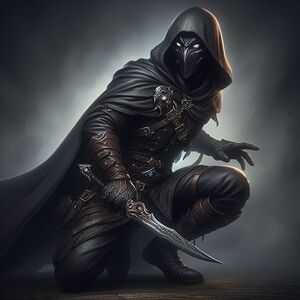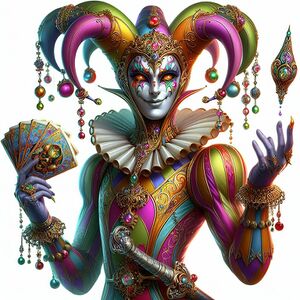| Player Name | What kind of question is that supposed to be? (Real Answer: Geoffrey) |
|---|---|
| Relatives | I am but one of many. |
| Languages | The Common Speech, Poetry of the Elves, and the Secret Language of (aka Common, Elvish, Thieves' Cant) |
| Affiliations | "The Masses" |
| Aliases | "The Fool" (real name unknown) Komos/Tragos (According to Tragos) |
| Marital Status | Why don't you come find out yourself? ;) |
| Date of Birth | The Day of Fools, of course |
| Place of Birth | The Spark of Joy |
| Date of Death | When the joys of the world leave the mortal coil |
| Place of Death | The End of Happiness |
| Species | Changeling |
| Gender | All of them, and none of them (Genderfluid) |
| Height | Varies (normal appearance 6') |
| Weight | Varies (normal weight 180 lbs) |
| Eye Color | Iridescent (Komos) Pure White (Tragos) |
"The Fool" is an enigmatic traveling entertainer who seeks to spread joy wherever they go.
Costume of The Fool (Physical Appearance)[edit | edit source]
The Fool is an elaborately dressed harlequin with pale purple skin and shoulder length glossy platinum hair hidden under their harlequin hood. They typically wear a colorful jester's costume with various bells and bangles. An ornate white jester's mask covers their face, conveying facial expressions through the shifting visage.
(A display of emotions is what I represent. Shifting and changing, like the passage of time.)
Myriad of Faces (Personality)[edit | edit source]
The Fool is... strange to say the least. They are always seemingly jubilant and are outwardly expressive no matter the situation. An eloquent story teller and entertainer, The Fool seems to have a disdain for sadness and sorrow, and always attempts to cheer up anyone they see.
(There is no place for sadness and sorrow in this world. Leave them and enjoy the wonders of happiness instead!)
Komos and Tragos[edit | edit source]
There appears to be another personality that inhabits The Fool who calls themselves “Tragos”. Tragos refers to The Fool as “Komos” and claims that they exist to balance out Komos. It is unknown how or why Tragos exists, and Komos seems to be unaware of their presence, as they do not seem to remember anything when Tragos takes control.
Compared to Komos, when Tragos takes control they wear simple dark leathers with a black cloak to easily blend into dimly lit areas. They wear a pure black mask that hides all signs of emotion.
Tragos is fairly cynical and sometimes sadistic, and usually makes snide or pessimistic comments. Despite their constant belittling comments, Tragos does seem to be fairly protective of Komos, and usually takes over in dangerous situations, before returning control at a safe time.
(I'll keep it short and simple. Don't cause problems, and I won't have to step in.)

Legend of The Fool (History)[edit | edit source]
There have been many theories as to who The Fool is and their origins.
Some people say that The Fool is a former royal jester, either retired from an ancient court, or on the run after greatly insulting a king.
Others believe that The Fool is an escaped circus performer who chose to go on their own journey, or exiled from their troupe.
A few say The Fool may be an avatar of some god linked to the performing arts from another world.
Some even believe The Fool is just some random wanderer, repenting for some unknown sin.
Only The Fool knows the truth, and even then, they never reveal anything about who they truly are, keeping their lips tightly sealed and reveling in the rumors instead.
Records have shown The Fool appearing in several places without reason, across both continents and time. However, the people who have met The Fool have all felt something about themselves change. Perhaps a trace of The Fool's humor and joy left behind?
The most recent appearance of The Fool was at the Tempest Brothers Expeditionary Company headquarters on the stroke of midnight on The Day of Fools in 824 PR.
(Think what you like, for a fool is everything and nothing you believe. A story is told better with mystery.)
(Shrouded in secrets? I prefer working from the shadows. Makes the cleanup easier.)
Words for the Masses (Languages)[edit | edit source]
The Fool is well versed in Common, although they occasionally sprinkle in Elvish words and phrases when talking. They also know Thieves' Cant, but that's supposed to be a "secret".
(Oh, I'm such a fool, revealing that! Keep a secret for me, won't you?)
(This is a matter of trust. Keep it, and we're allies. Break it, and you'll regret the days to come.)
Skills of the Trade (Powers and Abilities)[edit | edit source]
The Fool has various tricks and skills up their sleeves. They are skilled with costumes and disguises, and can freely change their appearance (Shapechanger) as a part of their Changeling nature. The Fool is also able to enchant their words, giving them the ability to encourage/empower and revitalize allies (Bardic Inspiration/Song of Rest/Mantle of Inspiration) both in the spur of the moment or during a rest. These words can also captivate an audience, influencing them to act favorably to The Fool (Enthralling Performance).
Additionally, they are quite nimble and quick on their feet (Cunning Action) and extremely dexterous, which makes their swordship extremely precise (Sneak Attack). Tragos appears to be the one responsible for Komos' roguish skills.
(A fool always reveals their tricks, for they would not be a fool if they didn't!)
(A blade is necessary to keep the balance. Not one more, not one less.)
Performance Tricks and Props (Attacks and Weapons)[edit | edit source]
The Fool is skilled in fencing and carries an elegantly crafted silver rapier (not mechanically a silvered weapon) along with an ornate jeweled dagger named "Comedy" and "Tragedy" respectively. "Comedy" is primarily used for swordship performances, while Tragedy is used for sleight of hand tricks, knife tricks and other dangerous performances. They also carry around what seems to be an endless supply of cards which are used for parlor tricks.
The Fool can also draw magic from the Feywild to enhance their performances with sounds or images (Minor Illusion). The same Fey magic can also amplify words to devastating effects: a simple insult can wreak mental havoc (Vicious Mockery/Dissonant Whispers) or disturb someone into faltering (Silvery Barbs), lull people into a slumber (Sleep), cause someone to lose themselves to a fit of laughing madness (Tasha's Hideous Laughter), or become completely captivated and lose their perception of everything else (Enthrall). Sometimes, some of "The Fool's" cards absorb Fey magic, which causes them to explode dangerously when handled (Spray of Cards).
(Comedy and Tragedy- two sides of the same coin. Let my performance sway you to your emotions!)
(Just be glad that you're on my side and my blade isn't pointed in your direction.)
Stories and Acts[edit | edit source]
Slay the Red Horror (Song)[edit | edit source]
”Deep in the mountains, a mighty roar echoes, as the belly of the beast rumbles hungrily for more.”
”A mighty red dragon, hailing from afar, has woken and thirsts for gold.”
”Pillaging and razing, as villagers run amok, as fear and despair spread among the folk.”
”’Fear not, people!’ A voice cried out from the distance, as several horses bringing the king’s guard arrive. “We will drive back this foul beast from these lands!”
”With mighty thrusts and blows and ballistas and bows, the dragon is driven back, but even then they do not forget.”
”Several days later, a group of adventurers set out, intent on slaying the Red Horror.”
”Sneaking into the lair, weapons at the ready, they delved into dark enemy territory.”
”Loud laughter bellows as the Red Horror reveals themselves, with crimson red blood staining their claws.”
”’You have made a poor decision, coming to my lair. Now you will suffer, and become part of my hoard.’”
”The heroes fought valiantly as blades and sorcery flew through the air, and with one final strike, the dragon breathed their last.”
”With head in hand, the heroes returned, showing the world that the Red Horror was no more.”
Dominion of Irivud (Tragedy)[edit | edit source]
"In a far away land, a kingdom stands, ruled by a mad child-king. His emotions ran wild, shaping the land, bringing fear and despair to all."
"Of all the people, there was a couple. Simple and content with their lives. Until the day a great storm grew in the distance, and tore them apart for eternity."
"The man survived, scarred and beaten, weeping in sorrow, then with resent. He set out on a quest against the child-king, crying for vengence, but in the end, the royal courtiers struck him down."
"Held in the dungeons, broken in spirit, the man thought death would be salvation, but the child-king had other plans."
"With a slam of his fist, the child-king sent the man back in time- back to the moment when he lost his wife."
"Tortured and tormented, the man tried to change fate- but slowly lost hope, until all there was left was a shell of his former sanity."
"The child-king relished in the man's suffering, cackling with glee- for he was the one in control. No one would stand in the child-king's way- for when the fury of storms strikes, the only thing remaining is ash and dust."
Trivia
- No one has seen The Fool in other attire, nor has anyone seen the face behind the Jester's Mask. (A fool must always be prepared to entertain. I can't be wasting time putting on makeup and costumes!)
- The Fool made their debut in RP chat at the stroke of midnight of April Fool's Day. Coincidentally, that is also their birthday. (A fool never appears without reason. Joy will be spread!)
- The Fool is inspired by a random rabbit hole involving Italian theater/opera, harlequins, tarot cards,
and embracing the insanity within :)(Sanity? That's just a construct made by the weeping masses that blocks the path to pure bliss and joy!) - On that note, The Fool is not related to Felix in any way, shape or form. Really. Anyone who tries to convince you so is lying. (They aren't connected for real)
- Dominion of Irivud is heavily influenced by The Duviri Paradox from the game Warframe.
- Komos represents The Fool's Bard aspect, while Tragos represents the Rogue aspect. Their names come from the Greek words for Comedy ("to revel") and Tragedy ("goat" for some reason) respectively.

